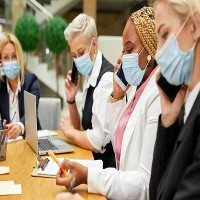15 October 2020
UN General Assembly Side Meeting on risk informed Covid recovery
A lot of risk assessments are performed, but too often they fail to fundamentally influence development and reduce risk. Changing this so that decision-making on all forms of development takes account of and reduces the risks that development often brings is a desire of disaster practitioners everywhere. Post-impact, the recovery phase provides another opportunity to incorporate understanding of risk into policy and practice, and there is therefore much discussion about what a post-Covid world could look like.
This was the rationale for a UN General Assembly Side Meeting on Disaster risk-informed and resilient covid-19 recovery, held on October 15, just after world Disaster Risk Reduction Day (on the theme of good governance).
I participated in a discussion panel on “Understanding systemic risk for transformational social and economic policy”. This was followed by a panel with brief presentations from members states and others. It was organised by the UN Office for Disaster Risk Reduction (UNDRR) with the International Labour Organization (ILO), the UN Office for least developed, developing landlocked and small island developing states, and UN Women.
In essence, the stated objectives were to: i) raise awareness that risk reduction is needed to achieve the SDGs (Sustainable Development Goals); ii) encourage governments and stakeholders to apply the Sendai Framework for DRR in Covid-19 response and recovery for a risk-informed future; and iii) to share experience in implementing the Sendai Framework and reducing disaster risk. In practice, the meeting had a strong theme on the fundamental importance of equity and justice through addressing the needs – through the SDGs – of the most vulnerable, marginalised and those who could be left behind. There was also concern about the state of the systems our planet provides to support all life including humanity. This is to be expected as the UN General Assembly’s Second Committee, who ran the meeting and is responsible for most of the Assembly’s work on the SDGs, states its aim as: “Building back better after Covid-19: Ensuring a more equitable global economy, inclusive societies and sustainable recovery.” This approach was well supported, for example the opportunity to reshape economies and societies was especially emphasised by the ILO, and a related statement from Canada, Australia, and New Zealand (CANZ) said “there should be no rollback of existing commitments,” [that] it is vital to promote full participation of people with disabilities, women and children,” and to not discriminate on the basis of sexual orientation.
There were no presentations from my panel. Instead we were individually asked questions by the moderator. In my case these were about aspects of systemic risk and the SDGs, and I commented about the independencies across the SDGs and importance of not seeing them as silos. We also discussed the need to go beyond a focus on the formal and official – most people work to some extent in the informal sector, and hundreds of millions depend on remittances. But it is more than these well documented points on livelihoods: informal discussions and interactions across disciples, sectors and worldviews can be one way to communicate and integrate our work largely free from the positioning and organisational interests that are almost inevitable in formal gatherings. Perhaps we should have more parties!
Fellow panel members, Rachel Cleetus of the Union of Concerned Scientists, talked about equitable policies for climate change and the imperative of drawing on science and evidence to take risk into account across government, commerce and civil society, and Aroma Revi of the Indian Institute for Human Settlements, talked about how much was being done at the city level drawing on experience in India in particular, and argued for stronger partnerships between national and local governments. Various nations read statements – there was not one from Austria but was one from Australia on behalf of the “Friends for Disaster Risk Reduction”.
When confronting these major challenges we can work within existing social and economic systems – which are giving rise to the problems – or substantially change them. It was not explicitly stated as such, but there seemed to be a generally optimistic view that we could manage without fundamental changes to our current systems. Given the trends in increasing emissions and inequalities it seems unlikely that we could meet the SDGs or climate commitments in the Paris Agreement, without major system changes - even though there are good examples.
I appreciate that I have learnt much about systemic risk from colleagues in IIASA’s RISK group; and especially thank Franziska Gaupp and Suzanne Hanger-Kopp for their helpful insights for this panel. A meeting summary is available here.
By John Handmer
Guest Research Scholar

PUBLICATIONS


